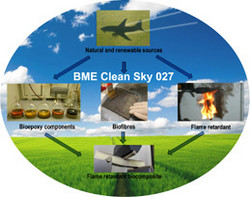Sugar and jute aeroplane panels
Stringent requirements for certification and the harsh environments to which composite materials are subjected pose formidable challenges to the use of natural materials. Scientists met these challenges with novel epoxies that can replace conventional mineral oil-based plastics with EU funding of the project 'Development of an innovative bio-based resin for aeronautical applications' (BME CLEAN SKY 027)(opens in new window). Researchers set out to synthesise resins from sugars obtained from sources that do not compete with foods. In order to meet aerospace requirements, they planned to integrate natural fibres to improve mechanical properties and apply a surface treatment to reduce flammability. Component synthesis was conducted according to principles of green chemistry, energy efficiency, environmental and health safety, and scalability. Scientists prepared multifunctional epoxy resins using glucose as a starting point. The team then synthesised three types of flame-retardant compounds using environmentally friendly agents that produce the harmless by-product ethanol. Four epoxy resin systems were fully characterised and one — based on glucofuranoside (GFTE) — was selected for up-scaling. Investigators then compared a variety of natural fabrics, including three types of hemp, three types of jute, two types of linen and a hemp–linen mix. Based on strip tensile test results and availability, a plain jute fabric was chosen to reinforce the epoxy resin and improve mechanical properties. The flammability of natural fabrics is an important issue. Two types of eco-friendly flame-retardant surface treatments (ammonium phosphate and aminosilane) were investigated in isolation and in combination. The combination provided the best balance of reduced flammability and increased thermal stability. Foam-core sandwich panel composites were manufactured from the bio-based GFTE matrix. Test results to determine utility as internal floor panels demonstrated that the panels significantly outperformed the conventional synthetic matrix sandwich structures. BME CLEAN SKY 027 has thus paved the way to use of eco-friendly biocomposites in lieu of carbon fibre-reinforced synthetic plastics in a variety of aeroplane interior applications.







